牛津译林版高中英语选修模块八 Reading课件配套教学案-新版
译林牛津版 高中英语选修八Unit 2 Reading教学课件 (共张PPT)

as__t_h_e_a__c_to_r_s_’_n__a_m__e_s_.
Finally it gives a__c_o__m_m__e_n_t__. It may include lots of words___t_h_a_t_d_e_s_c_r_i_b_e__fe_e_l_i_n_g_s________________ .
Outline of the film
电影Frozen以北欧为背景,是一个关于两个公主—安 娜(Anna)和艾莎(Elsa)的故事,她们住在阿伦黛尔 (Arendelle)王国。安娜和王子汉斯(Hans)一见钟情,姐姐 艾莎不同意他们结婚于是发生争执。姐姐因为生气,魔法 失控,把王国从夏天变成冬天。为了能让王国恢复夏天, 安娜开始寻找姐姐,在去北山的途中遇到了善良风趣的小 伙子克里斯多夫(Christoff)。不久之后安娜才知道汉斯并 不是真爱她,而是要处死她的姐姐夺取王国。
A brave prince, Calaf, (5)_s_o_lv_e_s_ the three riddles and finally marries Turandot.
It was first (6)s_t_a_g_e_d_ insided the Forbidden city in China in 1998.
What is red as fire , warm as fire but not fire and gets cold when you die?
blood
Turandot’s riddle 3
• 什么样的冰块使你燃烧, What was born
牛津译林版高中英语选修模块八 市骨干教师竞赛作品课件配套教学案-新版
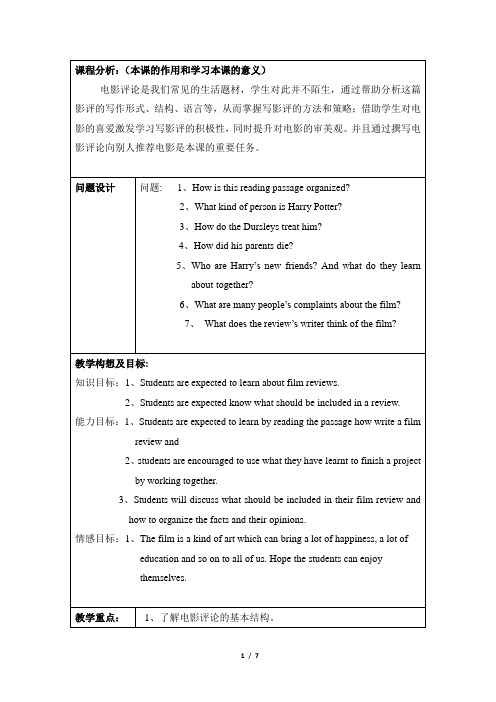
3、Students will discuss what should be included in their film review and how to organize the facts and their opinions.
4)Present your review to the others.
You decide which group’s performance is the best.
Group discussion about a film review.
小组合作是本课的主要教学方法之一,所以,课堂上应留一部分时间供小组讨论Part B的问题,消化上课所分析的影评结构和写作风格,制定本小组的合作计划,并向全班同学展示。
When you apply for a job, you _______________________
5) _______________________(世界杯的最精彩部分)will be shown this Saturday evening as we expect.
1)纳塔利想对我说的话好好想一想。
_________________________ filled her with fear.
1)大火发生在清晨,许多人在火中丧身。
_________________________2)许多外国游客问:“熊猫是不是只在中国的四川才有?”
_________________________3)我们怎么也没想到他成了著名的科学家。
牛津译林版高中英语选修模块八 牛津译林版模块8第四单元Reading学案-新版
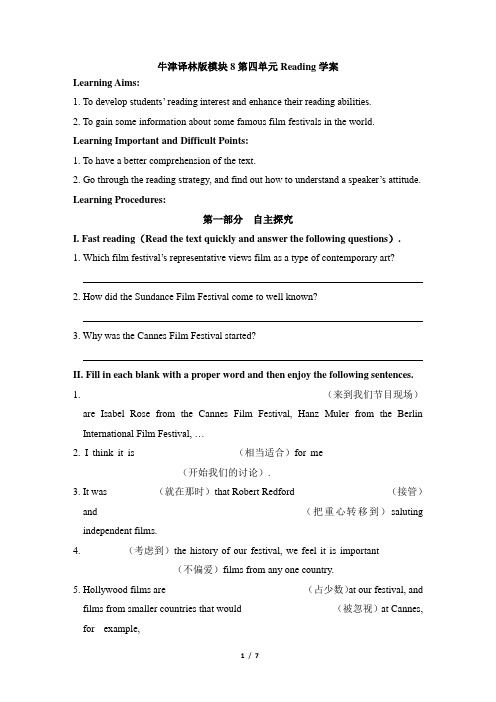
牛津译林版模块8第四单元Reading学案Learning Aims:1. To develop students’ reading interest and enhance their reading abilities.2. To gain some information about some famous film festivals in the world.Learning Important and Difficult Points:1. To have a better comprehension of the text.2. Go through the reading strategy, and find out how to understand a speaker’s attitude. Learning Procedures:第一部分自主探究I. Fast reading(Read the text quickly and answer the following questions).1. Which film festival’s representativ e views film as a type of contemporary art?2. How did the Sundance Film Festival come to well known?3. Why was the Cannes Film Festival started?II. Fill in each blank with a proper word and then enjoy the following sentences. 1. ________ ________ ________ ________ ________(来到我们节目现场)are Isabel Rose from the Cannes Film Festival, Hanz Muler from the Berlin International Film Festival, …2. I think it is ________ ________(相当适合)for me ________ ________ ________ ________(开始我们的讨论).3. It was ________ (就在那时)that Robert Redford ________ ________(接管)and ________ ________ ________ ________(把重心转移到)saluting independent films.4. ________(考虑到)the history of our festival, we feel it is important ________ ________ ________(不偏爱)films from any one country.5. Hollywood films are ________ ________ ________(占少数)at our festival, and films from smaller countries that would ________ ________(被忽视)at Cannes, for example, ________ ________ ________ ________ ________________(有机会获胜)in Berlin.6. ________ ________(尽管)we have only existed a short time, our festival________ ________________ ________(享有良好的声誉)worldwide.Ⅲ. Task-based reading(Read the text and fill in each blank with a proper word)第二部分达标测评IV. Reading Comprehension1. Films from ________ are very likely to win awards in the Venice Film Festival while films from ________ have more chances to win in the Cannes Film Festival.A. China & GermanyB. America & IndiaC. Italy & AmericaD. Germany & Korea2. Which of the following is closest in meaning to the underlined word “overlooked” in the sentence “ …and films from smaller countries that would be overlooked at Cannes …”?A. left outB. watched overC. paid attention toD. looked down on3. According to the passage , which of the following statements is NOT true?A. The Venice Film Festival is the oldest , which includes high-quality films.B. The Shanghai International Film Festival is the youngest , whose highlight is theGolden Cup Award.C. The Cannes Film Festival is the largest , where only American film can win awards.D. The Toronoto International Film Festival was started in 1975 , in which Canadianfilms can receive bonus awards.V. Study the text carefully and complete the following sentences(one word in each blank)1. 玛丽亚,给我们谈一谈威尼斯电影节吧。
牛津译林版高中英语选修八课件-Unit 1 The written word Reading-(共54张PPT)
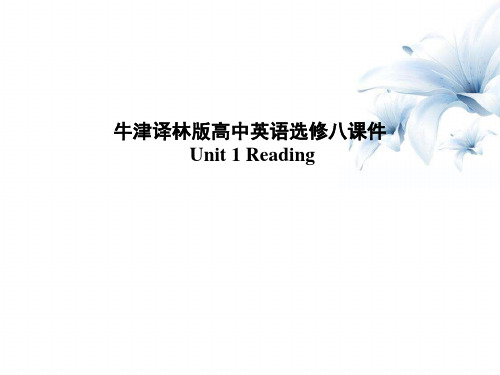
• characteristics desperate
• generous
criminal
themes
• twists
civil
plot
• The recent film, Great Expectations,
updates the (1)_p_lo__t_ of Charles
Dickens’s novel to modern times.
• 1. characters:d. Pip,
• 2. setting(戏剧J、oe小,E说st等ell的a )情节背 景: c. England in the early
1800s.
• 3. symbol:a. mist • 4. plot:
e. A stranger gives Pip a lot of money, then Pip moves to London and becomes ashamed of his background
• 2. Who is Charles Dickens? England’s greatest writer.
• 3. How old is Pip when the story begins?
Seven years old.
• C1. How well do you understand the essay? Read it again and answer the following questions. P4
• 1. antique(Line 1) c. a valuable thing from the past
• g. 2a.scehcatpiotenro(Lfianebo21o)k
牛津译林版高中英语选修模块八 选修模块8Unit1 Reading2学案-新版

牛津版选修8Unit1 Reading2学案Appreciating literatureTeaching aimsEnable the students to learn the usage of some new words.Teaching important and difficult pointsHow to use the words.Teaching procedures & waysStep 1 RevisionCheck the answers in Part E.1. authors2. Pip3. husband4. England5. symbol6. novel7. fortune8. gentleman9. shallow 10. themeStep 2 Language points1. They are novels, plays and poems that were written a long time ago and were so well written and well received that people still read them today. (P2)1) so…that…so...that和such...that的意思均为"如此……以致……",都用来引导结果状语从句so...that结构中的so为副词,后面跟形容词或副词;such...that中的such为形容词,后面接名词(名词前可以有形容词或副词修饰)。
例如:He became so angry that he couldn't speak.他变得很生气,以致说不出话来。
It was such a fine day that we went out for a walk.那是一个很晴朗的日子,我们出去散步.当that前的名词有表示数量多少的many, much, few, little等修饰时,只能用so,不能用such。
牛津译林版高中英语选修八Unit1ThewrittenwordReading教学设计2
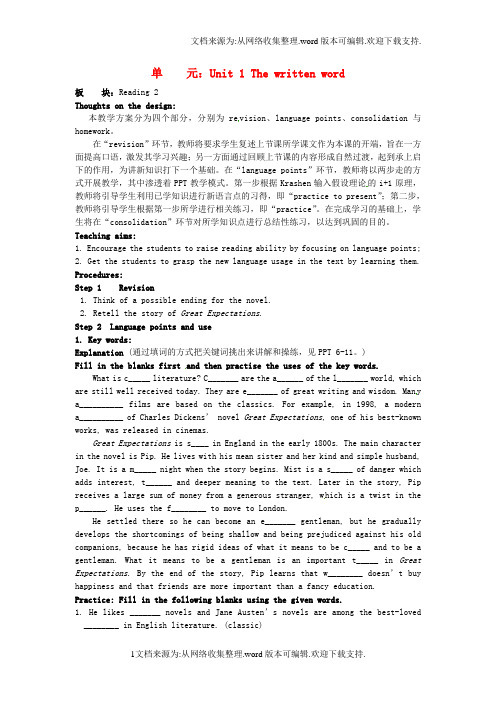
单元:Unit 1 The written word板块:Reading 2Thoughts on the design:本教学方案分为四个部分,分别为re vision、language points、consolidation与homework。
在“revision”环节,教师将要求学生复述上节课所学课文作为本课的开端,旨在一方面提高口语,激发其学习兴趣;另一方面通过回顾上节课的内容形成自然过渡,起到承上启下的作用,为讲新知识打下一个基础。
在“language points”环节,教师将以两步走的方式开展教学,其中渗透着PPT教学模式。
第一步根据Krashen输入假设理论的i+1原理,教师将引导学生利用已学知识进行新语言点的习得,即“practice to present”;第二步,教师将引导学生根据第一步所学进行相关练习,即“practice”。
在完成学习的基础上,学生将在“consolidation”环节对所学知识点进行总结性练习,以达到巩固的目的。
Teaching aims:1. Encourage the students to raise reading ability by focusing on language points;2. Get the students to grasp the new language usage in the text by learning them. Procedures:Step 1 Revision1. Think of a possible ending for the novel.2. Retell the story of Great Expectations.Step 2 Language points and use1. Key words:Explanation (通过填词的方式把关键词挑出来讲解和操练,见PPT 6-11。
译林牛津版高中英语选修八Unit1Reading(共46张PPT)

Key:
1. d 2. c 3. a 4. e 5. b
Prat C1 :Read and answer 1. Why don’t many people like the classics? Because they think classics are old and
ห้องสมุดไป่ตู้
2.Who is Charles Dickens? England’s greatest writer.
3.How old is Pip when the story begins?
seven years old.
Further reading Let’s learn something
more about Charles
3. What is written on Charles Dickens’s tomb? “By his death, one of England’s
greatest writers is lost to the world.” 4. What kind of person is Joe? Joe is a kind and simple man.
1. What is the definition of classic literature? Classics are the antiques of the literary world including novels, plays and poems that were written a long time ago and were so well written that people still read them nowadays.
牛津译林版高中英语选修模块八 选修模块8Unit2 Task教案-新版
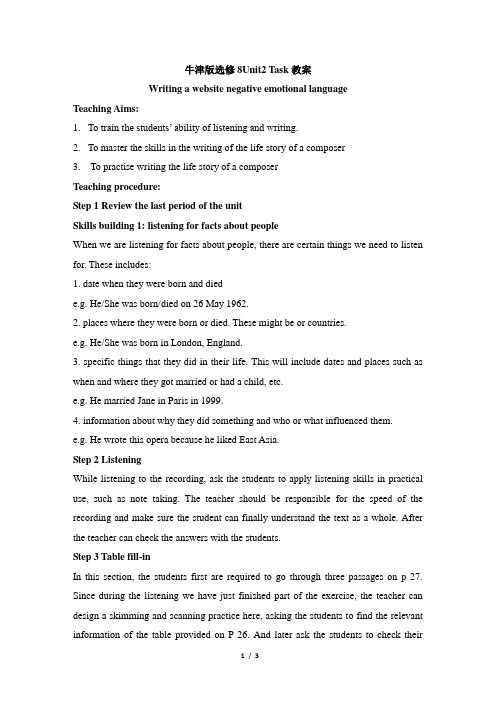
牛津版选修8Unit2 Task教案Writing a website negative emotional languageTeaching Aims:1.To train the students’ ability of listening and writing.2.To master the skills in the writing of the life story of a composer3. To practise writing the life story of a composerTeaching procedure:Step 1 Review the last period of the unitSkills building 1: listening for facts about peopleWhen we are listening for facts about people, there are certain things we need to listen for. These includes:1. date when they were born and diede.g. He/She was born/died on 26 May 1962.2. places where they were born or died. These might be or countries.e.g. He/She was born in London, England.3. specific things that they did in their life. This will include dates and places such as when and where they got married or had a child, etc.e.g. He married Jane in Paris in 1999.4. information about why they did something and who or what influenced them.e.g. He wrote this opera because he liked East Asia.Step 2 ListeningWhile listening to the recording, ask the students to apply listening skills in practical use, such as note taking. The teacher should be responsible for the speed of the recording and make sure the student can finally understand the text as a whole. After the teacher can check the answers with the students.Step 3 Table fill-inIn this section, the students first are required to go through three passages on p 27. Since during the listening we have just finished part of the exercise, the teacher can design a skimming and scanning practice here, asking the students to find the relevant information of the table provided on P 26. And later ask the students to check theiranswers by presentation.Skills building 2: finding out about people’s livesSometimes you need to find out a bout people’s lives. You can start by asking the following questions.Which city/country was he/she born in?When was he/she born?What instruments did he/she play?When was …written?When did he/she die?Where did he/she die?Did he/she have brothers/sisters? What were their names?When did he/she get married?Who did he/she marry?Can you tell me any other information about him/her?Is there anything else you can tell me about him/her?Step 2 asking for further informationIn this section, the students are supposed to work in pair to practice the skills in skills buildings 2. The teacher can encourage the students to pracise their spoken language during this part, and later the teacher can also provide the sample answers to the students.Skills building 3: writing someone’s life storyWhen writing someone’s life story on an exhibition board, you need to:1. Start with his/her name as a little with the dates of his/her birth and death underneath.2. Perhaps use a timeline to illustrate what the person did in his/her life.3. Write the information in the order that it happened.4. Include pictures to make it attractive.Step 3: writing the life story of a composerIn this section, the students should apply their learned skills to practical use. First they have to collect some facts about the composers, find out about people’s lives and thenwrite someone’s life story. The teacher first of all should remind the students of these steps and then give some instructions to the students. If it is needed, the teacher can also give the students a sample writing to show how they are supposed to phrase their article.Step 4 HomeworkPrepare for next period.。
译林牛津版高中英语选修8课件Unit2 Reading课件
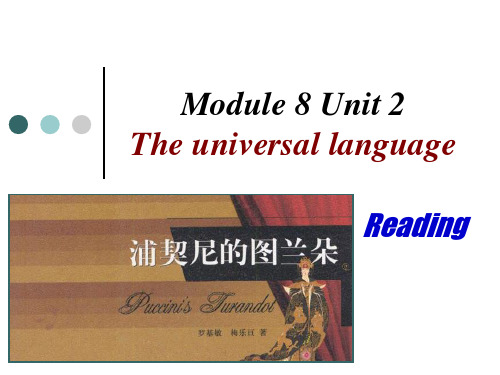
3. The review may include lots of very descriptive words that reflect feelings.
witness vt
to see something happen, especially an accident or crime:
Witness doing sth He arrived home just in time to witness his brother
being taken away by the police.
2. setting n.
the time and the place in which the action of a book, film, play, etc. happens
e.g. The play has its setting in a wartime prison.
be set in … e.g. The story was set in Britain of the
A: A review is a report or an essay giving some information as well as some opinion or ideas about a book, performance, a painting or something similar.
a list or poem
Language points
1. witness n.
a person who sees an event happening, especially a crime or an accident
牛津译林版高中英语选修八unit 1the written wordread

单元:Unit 1 The written word板块:Reading 1Thoughts on the design:本教学方案分为四个部份,别离为lead-in、 reading comprehensi on、 post-reading activities 与 homework。
在lead-in环节,教师将要求学生讲述一些中外古典高作,尤其有关Charles Dickens 其相关高作的情形作为本课的开端,以增加其文学知识及激发其学习情趣。
在reading comprehension环节,教师将以快速读、细读等方式培育学生的阅读能力。
在post-reading 部份,设计讨论题对学生进行发散性思维的培育和巩固所学。
所有步骤通过PPT展示出来。
Teaching aims:1. Students are expected to gain some knowledge about classic literature and someinsight into how to write an essay about literature;2. Students are expected to improve their reading skills by participating in theactivities designed.Teaching procedures:Step 1 Lead- in:Before class, ask students to search on the Internet or in books about famous Chinese and foreign classic literature, Charles Dickens and his works. Ask students to focus on the followi ng questions:What is the definition of clas sic literature?What famous Chinese and foreign classic literature have you read?Who is Charles Dickens? What books did he write? ...Begin the class by having students report their findings to the class.Step 2 Reading comprehension:Fast reading:Ask students to skim the essay and try to find answers to the following three questions:1. What is classic literature?2. Who is Charles Dickens?3. Who is the main character in the novel Great Expectations?Answers:1. Classics are the antiques o f the literary world including no vels, plays andpoems that were written a long time ago and were so well written that people still read them today.2. Dickens is England’s g reatest writer.3. Pip is the main character in the novel Great Expectations.Step 3 Second reading for general ideas:Ask students to scan the essay and try to find out the structure of the text: Part one: information about _____________.Part two: information about __________.Part three: information about ________________________.Key: classic literature; Charles Dickens; the book Great expectationsStep 4 Reading strategy:1. What does a persuasive essay try to do?2. What’s the writer’s point of view in this essay?3. How does the author try to convi nce the reader?Key: 1. To convince the reader to adopt a certain point of view.2. To persuade us to appreciate classic literature.3. At the start, she asks us to change our minds about classic literature.Then she gives us interesting facts about Charles Dickens and his book,Great Expectations, which makes us want to read the book at the end of theessay.Step 5 Listening and further comprehension of each part:Part one: Questions:1. Why don’t many people read the classics?2. What does Liz think about classic novels?Multiple choice exercise (PPT18—20)Part two: Questions:1. When and where was Charles Dickens born?2. What books did he write?3. What is written on his gravestone (tom b)?Present brief introduction to Dickens and works by Charles Dickens.Part three: Questions:1. What are the main elements of a novel?2. What does Pip learn by the end of the novel?3. What’re the main elements (要素) to consider when reading a novel?4. What makes a good persuasive essay?Step 6 Post-reading activities:Discussion:Can you think of some possible endings for the novel?Consolidation1. 2 matching exercises. (PPT 33-34)2.Fill in the blanks with the following words. (PPT35-36)Step 7 Homework:1. R ead the text again and try to retell the story of Great Expectations.2. Think of some possible endings for the novel and write it down.。
最新牛津译林版高中英语选修八unit 2《the universal language》reading教案2.doc
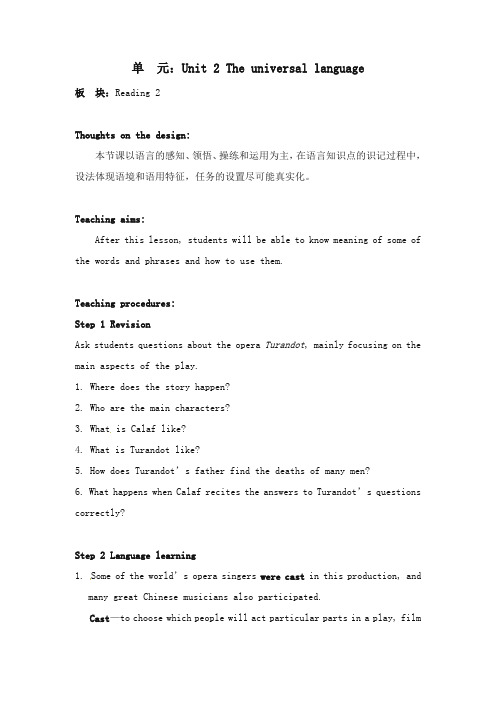
单元:Unit 2 The universal language板块:Reading 2Thoughts on the design:本节课以语言的感知、领悟、操练和运用为主,在语言知识点的识记过程中,设法体现语境和语用特征,任务的设置尽可能真实化。
Teaching aims:After this lesson, students will be able to know meaning of some of the words and phrases and how to use them.Teaching procedures:Step 1 RevisionAsk students questions about the opera Turandot, mainly focusing on the main aspects of the play.1. Where does the story happen?2. Who are the main characters?3. What is Calaf like?4. What is Turandot like?5. How does Turandot’s father find the deaths of many men?6. What happens when Calaf recites the answers to Turandot’s questions correctly?Step 2 Language learning1. Some of the world’s opera singers were cast in this production, andmany great Chinese musicians also participated.Cast—to choose which people will act particular parts in a play, filmPeter was expected to be cast alongside Douglas in the new film. 2. He liked East Asia very much and also wrote Madam Butterfly, which is set in Japan.be set in—if a film, play, story etc. is set in a particul ar place or period, the action takes place thereThe novel is set in France.3. Those who cannot answer all three riddles, however, will be condemned to death.be condemned to death—to give someone a severe punishment after deciding they are guilty of a crimeHe was found guilty and condemned to death.4. This means that few men would dare to ask for her hand in marriage. ask for one’s hand in marriage—ask sb. to get marriedAfter they fell in love with each other for nine years, John asked for Mary’s hand in marriage.5. However, although he would like to, he cannot break his promise and must allow Turandot to do as she wishes.break one’s promise—not keep one’s promiseThe government failed to keep its promise of lower taxes.= The government broke its promise.Have you ever broken your promise? When was that?6-7. Shortly afterwards, another prince, Cala f, falls in love with Turandot at first sight and decides to solve the riddles so that he can marry her.The report claims that when wo men fall in love, they tend to eat more. They meet and fall in love with each other during the Second World War. At first sight these deals might not appear to have much to do with each8.The story then take s on a classic love triangle between Calaf, Turandot and Liu.take on—to begin to have a particular quality, appearance, etc. After years of reform and opening-up policy, our country __________________When the Prime Minister began to tal k about the economic situations in the country, his voice ____________________.9. so Turandot seizes Calaf’s father and Liu, and demands that they tell her Calaf’s name or they will be beaten.demand to know/see/have etc. somethingI demand to know what’s going on.demand thatThey demanded that the military government free all political prisoners.demand something of somebodyIt seemed that no matter what she did, more was demanded of her. “Where are you going?” she demanded angrily.10. Liu claims that she alone knows the name, but resists telling her because she loves him.Resist—to stop yourself from having something that you like very muchcannot resist (doing) somethingI just can’t resist chocolate.She can never resist buying new shoes.It is hard/difficult/im possible to resist somethingIt’s hard to resist an invitation like that.resist the temptation/urge to do somethingShe resisted the temptation to laugh.11. Calaf scolds Turandot for not being more merciful.scold sb. for doing sth.Don’t scold her for be ing silly.12. … it has been transformed into the spot for a beautiful and sad love story.transform—to completely change the appearance or character of sth, esp. so that it is better.The company has been transformed from a family business to a multi-million-pound one.Is there an event that has transformed your life?Pieces of Titanic were transformed into luxury watches.Step 3 Follow-up Activity (PPT 13)Write a short story within 80 words, using five of the new words and expressions.Step 4 Homework1. Review what has been learned in today’s class.2. Finish the exercises on Page108.[Explanation]本节课首先复习课文内容,以免使得词汇学习太过突兀。
牛津译林版高中英语选修模块八 选修模块8Unit2 Reading教案-新版

牛津版选修8Unit2 Reading教案Teaching Aims:1. Learn and master the following words and expressions:Cast; fall in love; feature; unconditional; be drunk with; exercise control over; break one’s promise; terrify; conduct2. Train the students’ reading ability.3. Get the students to learn about the Turandot..Teaching Important Points:1. Learn to use the following useful phrases:Cast; fall in love; feature; unconditional; be drunk with; exercise control over; break one’s promise; terrify; conduct2. Train the st udents’ reading ability.Teaching Methods:1. Fast reading to get a general idea of the text.2. Careful reading to get the detailed information.3. Pair or group work to make every student work in class.Teaching Aids:The multimediaTeaching ProcedureStep 1 GreetingsStep 2 Lead-inTo start the lesson by asking the students some questionsAsk the students to talk freely in order to create an easy atmosphere to encourage the students to practise their spoken language. Ask the students to prepare some information in advance. Get the student to have a general idea of the opera.Step 3 Reading StrategyExplain the definition of a review to the students since different types of article have various ways of reading.1. What’s the definition of a review?A review is a report or an essay giving some information as well as some opinion orideas about a book, performance, a painting or something similar.2. What should we pay attention to while reading a review of an opera?a. A review of opera usually starts with some background information.b. The review can five some important such as the actor’s names and finally an evaluation.c. The review may include lots of very descriptive words that reflect feelings.Step 4 Fast readingAsk the student to scan the text to finish the exercises in Part AStep 5 Listening and comprehensionListen to the recording and ask the students to finish the exercises on P 20 Part C1 Answers:1. Because she felt that she could almost feel the history.2. She is cold-hearted.3. He was killed.4. She does not have to marry him.5. He promised to allow Turandot to choose her own husband.6. Eight.7. Turandot was played by Sharon Sweet from the USA, Liu was played by Barbara Hendricks from the USA and Calaf was sung by Kristian Johannsson form Iceland. 8. The bringing together of the group of people from many countries, the music and the setting.Step 6 Post-readingIn order to have an accurate understanding of the text, ask the students to finish Part D on P20. And explain some more language points to the students.1. witness n.e.g. According to (eye) witnesses, the robbery was carried out by two teenage boys. witness vt witness doing sthe.g. He arrived home just in time to witness his brother being taken away by the police.2.star vt (e.g. The studio would like to star her in a sequel to last year’s hit.)cast vt (e.g. The doctor decided not to cast his new film with big-name actors.)3. setting n. e.g. The play has its setting in a wartime prison.be set in … (e.g. The sto ry was set in Britain of the nineteenth century.)4. take ona. to accept a particular job or responsibility:e.g. She took too much on and made herself ill.b. to employ someone:e.g. She was taken on as a laboratory assistant.c. to compete against or fight someone:e.g. The Government took on the unions and won.d. to begin to have a particular quality:e.g. Her voice took on a troubled tone.5. exercise vt (to use one’s right, power or influence)e.g. The young employer simply does not know how to exercise his power over his employees.Since you’re a citizen of our country, you should exercise your right to vote.6. be desperate to do sth./be desperate for sth.( to be eager or in great need to do/for sth.)e.g. The old man was desperate to see his son, Who had left home to study abroad.The boy is desperate for a new pair of football shoes.7. leave vt 常用“leave+宾语+宾补”结构(to let sb. do sth. or be in a state/to let sth. be in a state )e.g. My grandma is over 80 years old, so do not want to leave her alone at home.The poor farmer died, leaving his wife and three children in poor conditions.When the couple went on holiday, they left their pet dog in the care of a friend.8. transform vt (to make a complete change of the appearance or character of)e.g. Plenty of rain might transform the area from a desert into a place full of plants.It is said that the old railway station built about 100 years ago will soon be transformed into a railway museum.Step 7 Homework。
牛津译林版高中英语选修模块八 译林模块八Unit4 Reading教案-新版

译林牛津版模块八Unit4 Reading教案Important film events around the worldTeaching Aims:1. Learn and master the words and expressions in the text:2. Train the students’ reading ability.3. Get the students to learn about international film festivals.Teaching Important Points:1. Learn to use the words and expressions in the text:2. Train the students’ reading ability.Teaching Difficult Points:How to help the students understand the text exactly, especially the following sentences:Teaching Methods:1. Fast reading to get a general idea of the text.2. Careful reading to get the detailed information.3. Asking-and-answering to help the students understand the text exactly.4. Pair or group work to make every student work in class.Teaching Procedures:Ⅰ Greetings and lead inPlay a video about the 12th Shanghai Film FestivalCan you name some famous Film Festivals?II Presentation for ReadingT: Today we’re going to read a passage “important film events around the world”You will know more about international film festivals. So please Go through the passage as quickly as possible and try to find answers to the questions.How many film festival representatives appeared on the show?2 Who are festival representatives appearing on the show? Where are they from?.Step III detailed readingI. True or false, if false, please correct it1Movie Magic is a weekly programme.2The Venice Film Festival is the youngest film festival in the world.3The Sundance Film Festival includes those financed by Hollywood studios.4Cannes can make films famous.5Hollywood films are the majority at the Berlin Film Festival.6Toronto International Film Festival gives some bonus awards to Canadian films.7Hanz represents the Shanghai International Film FestivalII Answer the detailed questions:1. Which film festival’s representative views film as a type of contemporary art?2. How did the Sundance Film Festival come to well known?3. Why was the Cannes Film Festival started?4. What is the difference between the Cannes Film Festival and the Berlin Film Festival?III Now listen to the tape and try to fill in the table (within 3 words)Step IV consolidationFilms from ___are very likely to win awards in the Venice Film Festival while films from ___ have more chances to win in the Cannes Film FestivalA. China;GermanyB. America;IndiaC. Italy;AmericaD. Germany;KoreaWhich of the following is closest in meaning to the underlined word “over-looked” in the sentence “…and films from smaller countries that would be overlooked at Cannes …”A left outB watched overC paid attention toD looked down onAccording to the passage, this of the following statements is not right:A The Venice Film Festival is the oldest, which includes high=quality filmsB The Shanghai International Film Festival is the youngest, whose highlight is theGolden Cup AwardC The Cannes Film Festival is the largest, where only American film can win awardsD The Toronoto International Film Festival was started in 1975, in which Canadian films can receive bonus awards.Step V Group work(1)You are a reporter .Please have a talk between Maria and Kathy about the Film Festival(2) You are a reporter. Please have a talk between Hanz and Isbel about the Film FestivalStep VI Homework1. Part D and E on page 53.2. Prepare the language points..。
牛津译林版高中英语选修模块八 选修模块8Unit2 Project教案-新版

牛津版选修8Unit2 Project教案The universal languageTeaching aimHelp students use what they have learnt to finish a project by working together. Teaching important and difficult points1. Help the students understand the text to collect as much information as they can.2. Ask the students to have a discussion about which singer or band they will focus on, what they will include in the project and how they can organize their webpage. Teaching aidsA computer and a projector.Teaching procedures:Step 1 Dictation.Step 2 Lead-inIn this unit, we have discussed different kinds of music. So today let’s have a closer look at the history and development of pop music.Step 3 First readingAsk the students to read the article “From jazz to pop” and then answer the qu estions. What is this text mainly about?It is about the history and development of pop music.How many periods can pop music be divided into according to the writer?Five periods. Early jazz, swing music, R&B, rock and roll, and 1960s pop music. Step 4 Second readingRead different parts of the text on by one.1. What was the most important instruments used in jazz?The trumpet is one of the most important instrument used in jazz2. Who is considered as one of the founding fathers of jazz?Louis Armstrong1. What is the difference between swing music and traditional jazz?Swing music is faster than traditional jazz and have a sort of swinging feel to the music.2. What are included in “big bands”?Big bands included a pianist a violinist and a bassist, as well as others.3. Who is considered as one of the pioneers of rock and roll?Big Joe Turner.1. Which band was the most successful rock and roll band of the 1960s?The Beatles.2. What is “Beatlemania”?The phenomenon that masses of fans of the Beatles welcome this band at the airport. Step 5 Finish exercises B1 and B2 on the page 109Step 6 Discussion.Work in groups to discuss how to research and what to research about a singer or a band and then answer the questions in part B.Step 7 HomeworkEach group should choose a singer or a band to research and then divide the work among group members. Each group member will be responsible for searching for some information. Use the information collected to make a webpage after class and present them to the class on the display wall.。
牛津译林版高中英语选修模块八 选修模块8Unit1 Grammar教案1-新版

牛津版选修8Unit1 Grammar教案Teaching aims:1.Enable the students to learn different kinds of negative statements.2.Help the students to learn how to use these negative statements correctly. Teaching important and difficult points:Teach the students to use the negative statements correctly and properly.Teaching methods:Analyzing, summarizing and practicingTeaching aidsA projector and a computerTeaching procedures & waysStep 1: General introductionThe grammar items in this unit focus on negative statements. You are expected to understand the meanings of negative statements. You will also learn the ways to make a negative statement. Then you may apply what you have learnt to practical use by finishing two exercises.Step 2: ExercisesTurn the following into negative statements:1. They’re listening to pop music now.________________________________2. Many people can speak English nowadays._________________________________3. You must make your bed after you get up every day._______________________________________________4. His mother has a beautiful car.________________________________________________5. We need a pen and piece of paper.________________________________________________6. I need wear a warm coat._________________________________________________7. The old man always goes for a walk in the park after supper._______________________________________________8. The doctors volunteer in the countryside every year._________________________________________9. Mike does sports in the afternoon.________________________________10. You’d better talk with your parents right now.___________________________________Keys:1. They aren’t listening to pop music now.2. Many people can’t speak English nowadays.3. You don’t have to make your bed after you get up every day.4. His mother doesn’t have a beautiful car.5. We don’t need a pen and piece of paper.6. I needn’t wear a warm coat.7. The old man seldom goes for a walk in the park after supper.8. The doctors don’t volunteer in the countryside every year.9. Mike doesn’t do sports in the afternoon.10. You’d better not talk with your parents right now.Step 3: Explanation and practice:1. Make a list of the most commonly used negative words:no, not, never, neither, hardly, seldom, few, little, barely…2. Please decide whether it is a true statement:John Keats was a famous short story writer.This statement is untrue.We can correct an untrue statement in the following way:John Keats was not a famous short story writer.3. As we lea rned, negative statements are often used to correct a mistaken idea. Let’s recall the ways to make negative statements.4. Read Part 1 and Part 2. When not is used with a negative prefix, the meaning of thesentence is positive. However, the positive meaning is not as strong as that of a direct positive statement. For example:Students are not discouraged to discuss things with their classmates. (Students are encouraged to discuss things with their classmates.)Your actions were not inexcusable, but they were certainly not appropriate. (Your actions were excusable, but certainly not appropriate.)It is not uncommon for him to be late. (It is very common for him to be late.)not can be used before a phrase of time, distance or a noun phrase to emphasize the negative meaning of the phrase. For example:It is not a long distance from the city center to the new railway station. (=It is very near from the city center to the new railway station.)It will not be long before most people around the world know how to use a computer. (=Soon, people around the world will know how to use a computer.) There were not many people present for the lecture. (=There were very few people present for the lecture.)5. Read Part 3. In informal English, the negative expressions can be used with whether and if to show doubt or uncertainty. For example:I wouldn't be surprised if they didn’t buy a house soon.(=I wouldn’t be surprised if they bought a house soon.)I wonder whether/if I shouldn't get a haircut. (=I wonder whether/if I should get a haircut.)I wonder whether/if I shouldn't buy a new suit. (=I wonder whether/if I should buy a new suit.)6. Read Part 4. Pay attention to some negative expressions.on no account, in no circumstances, never before, nowhere, at no time, by no means, 7. Read a book report written by Sharon. Try to cycle the negative statements. Answers:A 1 … he experiences an abnormal childhood without any parents.2 He is raised in a place with other children who also have no parents.3 He is then sent to a workhouse, where he has to work very hard and hardly hastime to relax.4 Oliver does not like anything about the workhouse.5 He is treated very badly and seldom has enough food or water.6 Fagin is not a good character and cares only about himself.7 Oliver does not know anything at first and stays with Fagin.8 He does not want to steal from anyone, but in order to survive, Oliver is forcedto become a criminal.9 Mr. Barnlow is a man without any of Fagin’s vices.10 Unless Oliver can escape, he will never be reunited with Mr. Barnlow.11 He will have only misfortune, not a real family and the love he deserves, which is the major theme of the book.8. Finish Part B individually.AnswersB 1 surprised if, didn’t2 not uncommon3 Not many4 wonder whether/if, shouldn’tStep 4 Language points1.serve(P8)verb [T] : 服务,接待to provide food or drinks: 提供食物,饮料等servicenoun [U] : 服务,接待2.raise (P9)verb [T] : 抚养;抬高, 提高; 举起3. abuse(9))verb [T] : 虐待4. get caught(P9)verb [L + past participle] getting, got, got or US gottensometimes used instead of 'be' to form the passive: 5.pressure(P9)pressverb [I or T;]: 按,压6.threat (P9)noun [C] : 威胁threaten[T] : 威胁Homework1.C1 & C2 in the workbook.2.Unit Revision: Period 5.。
牛津译林版高中英语选修八《Unit 2 The universal language》 reading 教案 3
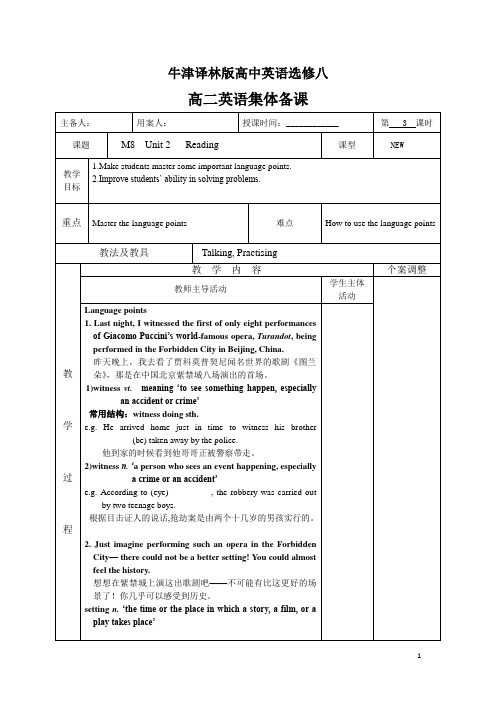
她承担了太多工作,这是她病倒了。
c. to employ someone:
e.g. She was___________as a laboratory assistant.
她受聘当一个实验室助理。
d. to compete against or fight someone:
板
书
设
计
教
学
札
记
根据目击证人的说话,抢劫案是由两个十几岁的男孩实行的。
2. Just imagine performing such an opera in the Forbidden City— there could not be a better setting! You could almost feel the history.
牛津译林版高中英语选修八
高二英语集体备课
主备人:
用案人:
授课时间:____________
第3课时
课题
M8Unit2Reading
课型
NEW
教学目标
1.Make students master some important language points.
2.Improve students’ ability in solving problems.
重点
Master the language points
难点
How to use the language points
教法及教具
Talking, Practising
教
学
过
程
教学内容
个案调整
【全版】英语选修8译林牛津版unitreading课件推荐PPT

1. Some people think that classics are old-fashioned because of the following statements except __________. A. they were written a long time ago. B. the language used in them is quite different from the language used today. C. they are difficult for people to understand. D. They can only be found in bookshops and libraries.
Fast reading:
Go through the passage as quickly as possible and try to find answers to the three questions in part A on Page 2.
1 Classics are the antiques of the literary world including novels, plays and poems that were written a long time ago and were well written and received.
C2 1 d 2 c 3 a 4 b 5 e
Listen to the tape and choose the Excited by his move to London, Pip can hardly wait to begin his new life.
Listen to the tape and choose the best answers: at a time
- 1、下载文档前请自行甄别文档内容的完整性,平台不提供额外的编辑、内容补充、找答案等附加服务。
- 2、"仅部分预览"的文档,不可在线预览部分如存在完整性等问题,可反馈申请退款(可完整预览的文档不适用该条件!)。
- 3、如文档侵犯您的权益,请联系客服反馈,我们会尽快为您处理(人工客服工作时间:9:00-18:30)。
They have known the general idea of the passage. Ask three questions to further their understanding of this text.
Suggested answers:
能力目标:Check and enhance students’ reading ability.
情感目标:Students are expected to gain an overall understanding of the world-famous artists and their works.
Read the e-mail quickly and answer the following questions:
1. Which countries has Li Ming visited on this trip?
2. How many days did they spend in Paris?
Step2. Skimming
Give students 3 questions and let then to answer them.
Suggested answers:
1.Spain,France, Netherlands
2. Four days
3. Another museum in Amsterdam
1. If there isn’t an art museum in your city or town, do you think you need one? Why or why not?
2. Do you think art is important? Why or why not?
利用welcome to the unit引起学生对艺术作品的兴趣。作为本节课的导入。
教学重点:
Help students learn the reading strategy of how to read a life story.
教学难点:
Enable students to master the reading strategy through doing some reading comprehension exercises.
Step8. Summary and homework
Today we have learnt something about the arts and artists. After class, try to read the passage as fluently
as possible.
Enjoy these pictures and identify their types.
教师活动
学生活动
设计意图
Step 1. Lead-in
Show some paintings to students and ask them to identify the types of those paintings.
(oil painting , landscape ,still life , cubist painting , portrait , watercolor painting)
Reading教学案
课程分析:(本课的作用和学习本课的意义)
这是一节有关艺术欣赏的一篇课文。把welcome to the unit和reading结合在一起来设计的。针对于艺术班的特点,首先由大量的艺术作品图片导入,以引起学生的兴趣。这节课在介绍了reading strategy之后,立刻让学生完成C2这部分练习加以巩固,并且引入一篇人物传记的文章的一部分,让学生感觉到这个技能在高考答题过程中是很实用的。让他们立刻有成就感。因为这节课的内容与他们平时的生活很接近,因此整堂课学生注意力都比较集中,效果不错。可见,最好的老师是兴趣。
掌握Skimming这一阅读技巧,并且能迅速通过关键词找出题目的答案。
告诉学生怎样去阅读一篇人物传记,要抓住哪些要素,并通过C2这部分练习来练习。
结合高考试卷的题型,给出一篇人物传记的文章。做到阅读技巧的讲练结合。
训练学生对细节题的查找。
希望能给学生一点艺术的熏陶。
讨论部分是一个让学生把一节课所学的内容在头脑里消化再输出的过程。
3. Musee d’Orsay.
Step6. Appreciating
Show some pictures of some artists and their famous works.
Step7. Discussion
Divide students into groups of four, and have a discussion.
1. Cubism is a type of art
developed by Pablo Picasso
that represents things as
geometric shapes.
2. He was also a sculptor, an architect, an engineer and a scientist.
Step4. practice
Show a part of a passage that describes a famous English writer on the screen, and let students finish a multiple choice question.(见课件)
Step3. Reading strategy
Tell students that when they are reading someone’s life story, they should pay attention to the following tips:
1. The text goes in the order that things happened.
3. Where are they going next?
Finish Part C2, pay attention to the artists’ date of birth and death, and their famous works.
the answer after reading the passage.
5. What did da Vinci do besides painting?
6. In which museum can you see Monet’s work?
教学构想及目标:
知识目标:Learn to read a life story of biography with the help of the time order.
教学方法:
1. Individual, pair or group work to make every student take part in the class.
2. Use some exercises to improve students’ reading ability.
所需设备:
校园网、多媒体投影(展示学习网站和多媒体课件)
问题设计
问题:1. Which countries has Li Ming visited on this trip?
2. How many days did they spend in Paris?
3. Where are they going next?
4. What is cubism? Who developed it?
2. The text begins by talking about when and where.
3. Their famous works and the style of their works will be talked about if he/she is an artist.
4. The date of their birth and death.
熟读文章,加深对文章及词句的理解。
1. What is cubism? Who developed it?
2. What did da Vinci do besides painting?
3. In which museum can you see Monet’s work?
Just appreciate some pictures.
